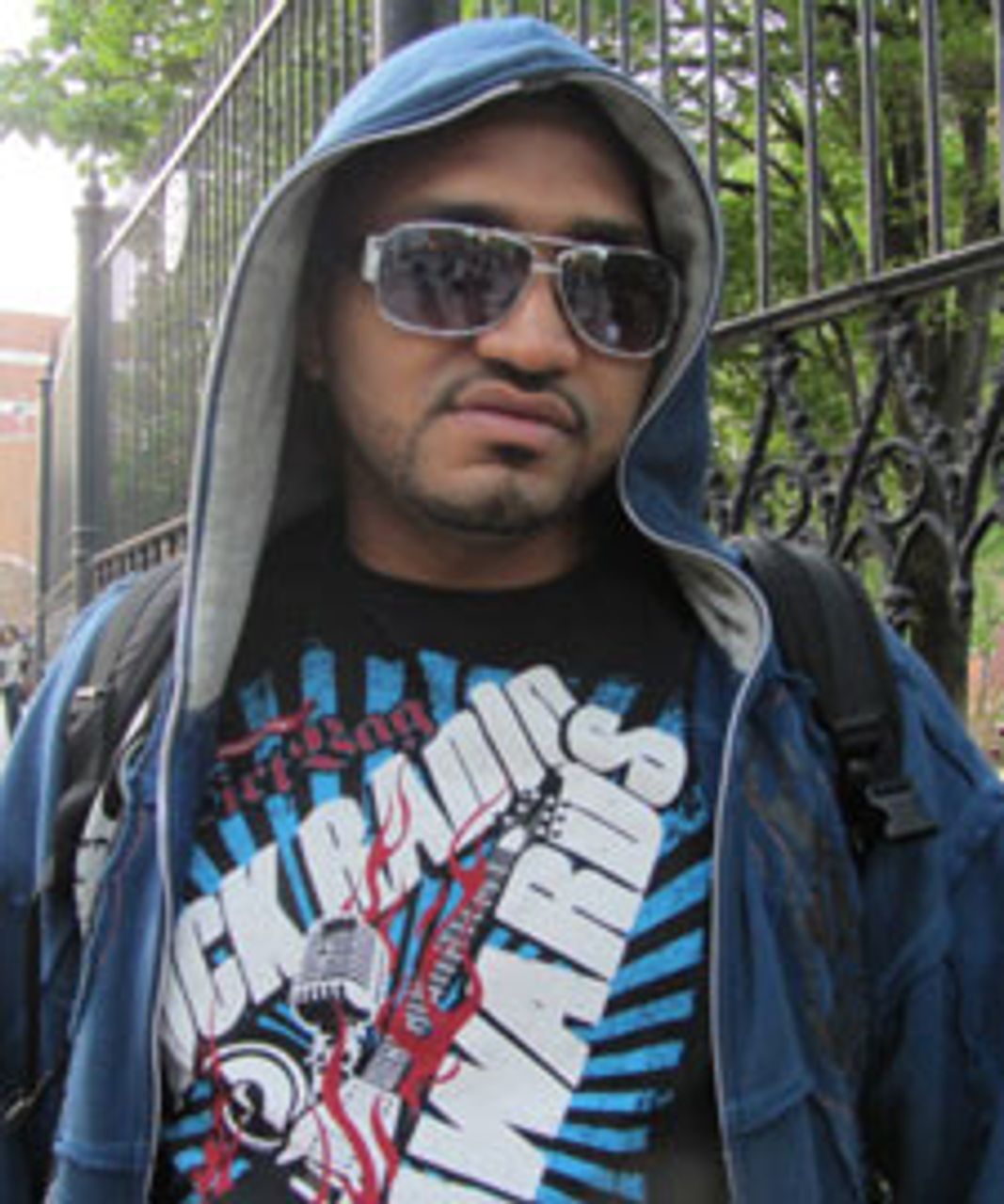Supporters of the Socialist Equality Party election campaign, Jerry White for president and Phyllis Scherrer for vice president, distributed statements and spoke to workers and young people in cities throughout the country over the weekend.
Campaigners distributed copies of White’s statement, “Obama’s ‘Buffett Rule’ fraud and the need for socialist planning,” and talked to workers about social inequality. The statement notes that during Obama’s “recovery,” 93 percent of all income growth has gone to the top one percent.
In Boston, Massachusetts, SEP supporters campaigned outside the Community College transit stop in the Charleston neighborhood.
 Chris McSherry
Chris McSherryChris McSherry, a student at University of Massachusetts, Boston, said, “I don’t think it’s fair that there are two main people in every election: the nominee for the Democrats and the nominee for the Republicans. I don’t think it’s right; the deck’s stacked and it’s going to be one of those two. Whoever the third candidate is every year, inevitably they bow out because they don’t have a chance.”
We discussed how the Obama administration has proposed lowering the corporate tax rate from 35 to 28 percent.
“I don’t get that,” Chris said. “Not only that, I read an article that the rich were concerned that Obama wants to tax them more.” The campaigners noted that he was probably referring to the Buffett rule. “He knows that there’s no chance of getting that passed,” Chris said. “So many of them are millionaires in Congress to begin with—they’re not going to pass it.”
The discussion turned to how Obama was holding up Detroit as a model for the nation to emulate following the auto bailout. Chris asked, “Does that mean by being a model you can just be financially incredibly irresponsible? You hope that someone will bail you out, and then when they do you can just screw the working class?
“The higher-ups still make money, even though they’re the ones that led the company down. Like you said, the workers are now making half. I’d be interested to know if the CEO is making half of what he was making before. I would guess not, and how is that fair?
“I’m not a CEO. My father’s a firefighter, and my mom cuts hair. It just angers me. I hate the Democrats. I hate the Republicans a little bit more; it seems like they’re for the rich. But I think the Democrats talk a lot of bull, like they care about the working class. But a lot of them are rich, but just don’t flaunt it as much as the Republicans do.
“Like I said before, I don’t think it’s right that they’re the only choice, and I don’t think it’s right that everybody in the country just accepts the fact that it’s going to be Romney or Obama. Can’t there be somebody else? I don’t know about your candidate, Jerry White, I’ve never heard about him. But why can’t he come out of nowhere, and have good policies and have a legitimate shot at actually winning?”
In Chicago, SEP supporters spoke with Daniel Virgil, a criminal justice major at the University of Illinois, Chicago, and asked him if he thought inequality should be addressed in the presidential campaigns. “I hate politics. Democrats, Republicans, they’re all crooks. I don’t care if he [Obama]’s black, he’s a crook. And then we come to learn that [Chicago Mayor] Rahm Emanuel is good friends with Obama? Look what Emanuel’s doing: taking people’s jobs away.
“But you know what really scares me? The Bill of Rights, the Constitution, all that—it doesn’t mean anything. It means nothing. Pretty soon, we will have no rights. I see all these gangbangers trying to get rich, and all I can say is, ‘Wake up. Do you know what is happening?’”
Daniel expressed skepticism about whether real change could be made. “I love what you’re doing, but I don’t think it’s gonna change.”
Campaigners discussed the relationship between growing social inequality, political repression and war. Daniel noted that he has friends in the military in Iraq, and said they were basically prison guards, maintaining and policing large prisons.
Campaigners handed a leaflet to a Chicago Transit Authority Bus Driver waiting on his shift change. He went off and spoke to another bus driver, who rushed over to grab a flyer before getting on his own bus.
In New York, campaigners visited the campuses of the City’s universities. New York City is home to the City University of New York (CUNY), the nation’s largest urban university system, with close to 500,000 students. CUNY is in the midst of implementing a drastic tuition increase of 30 percent by 2015. Nearly forty percent of CUNY students come from families with household incomes of less than $20,000.
Several students expressed outrage at the profiteering by major corporations, and frustration with a political system that is unresponsive to the needs of the population.
 Michael McKay
Michael McKayMichael McKay, a business student at the Borough of Manhattan Community College, explained, “The only reason I voted last time for Obama was that I thought there was a one percent chance for revolution. But Obama wants to work with the Republicans. That makes me know that he supports the car companies and the oil companies, which are helping to destroy the environment. Why can’t human beings get a percentage of this money that the oil and gas companies are making?”
At LaGuardia Community College in Queens, a computer technology student remarked that she thought the Buffett Rule proposal should be supported because “we all agree the rich should pay more taxes.” After discussing the fraudulent nature of the proposal and reviewing the recent extreme growth in inequality, she still held out hope that there could be some class compromise, adding that she agreed with many of the SEP’s ideas but at present we need to “take what we can get.”
George Steel, a business student at St. John’s, a private university in Queens, addressed the immediate impact of the economic crisis on his family. “It’s awful,” he said. “My mom has been laid off for eight months. She worked in accounting. I am doing all right though, because I know how to budget.” He added that his student loans will take 30 years to pay off.
Asked what he thought needed to be done about the economic situation, he responded, “I think people need to shop at small businesses.” Campaigners explained that the SEP’s program calls for nationalizing the major corporations. It is necessary, they explained, to bring economic life under the democratic control of working people, without which there can be no solution to unemployment and inequality.
